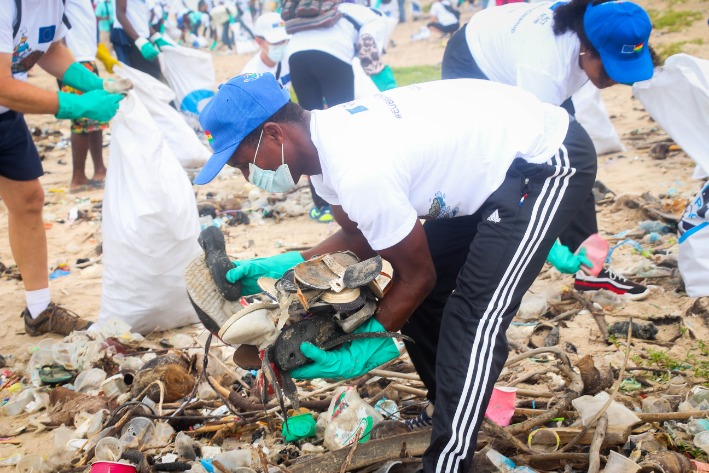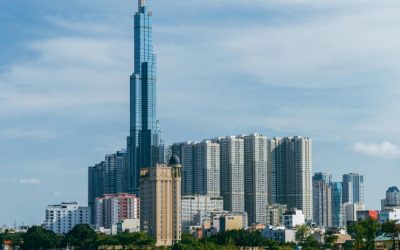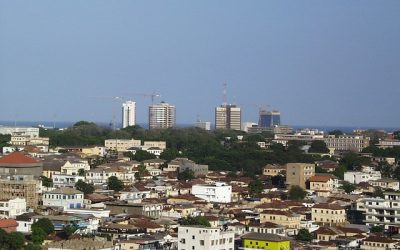Overview of Beaches in Ghana
Ghana is renowned for its stunning coastline, which stretches along the Gulf of Guinea and offers an array of beautiful beaches. These beaches attract travelers and locals alike with their golden sands, clear waters, and vibrant atmospheres. From lively beaches with bustling markets and water activities to tranquil spots perfect for relaxation, Ghana’s beaches provide something for everyone to enjoy the natural beauty and cultural richness of the region.
Geographical Distribution
Ghana is renowned for its stunning beaches along the Gulf of Guinea, offering a diverse array of scenic coastlines. These beaches are spread across the various regions, providing both local residents and tourists with picturesque spots for relaxation, water sports, and cultural experiences.
The majority of Ghana’s beaches are situated in the Greater Accra Region, particularly around Accra, with popular destinations such as Labadi Beach and Kokrobite Beach. The Central Region boasts beaches like Cape Coast and Elmina, known for their historical significance and natural beauty. In the Western Region, beaches such as Busua, Akwidaa, and Dixcove are famous for their surfing opportunities and pristine environments. The Volta Region also features serene beaches like Adina and Klikor, offering a more tranquil experience.
Across these regions, Ghana’s beaches are characterized by their golden sands, clear waters, and vibrant coastal communities. Many of these beaches are accessible and well-developed, making them ideal spots for tourism, local recreation, and cultural festivals. The geographical distribution highlights Ghana’s diverse coastal landscape, which contributes significantly to its tourism industry and local livelihoods.
Significance to Local Culture and Economy
Beaches in Ghana are renowned for their natural beauty, sandy shores, and vibrant coastal atmosphere. They stretch along the Atlantic Ocean, offering some of the most picturesque scenery in West Africa. These beaches attract both local residents and international tourists, contributing significantly to the country’s tourism industry. Many beaches in Ghana are popular for activities such as swimming, surfing, and beach sports, making them essential recreational spots for communities.
The significance of Ghanaian beaches extends beyond leisure; they hold deep cultural and historical importance. Traditional festivals and ceremonies are often held on or near the beaches, reflecting the rich cultural heritage of coastal communities. Several beaches also serve as sites for important historical events, including those related to the transatlantic slave trade, which has shaped Ghana’s historical identity.
Economically, beaches play a crucial role in supporting local livelihoods through tourism-related businesses such as hospitality, food vendors, and craft markets. Coastal communities benefit from employment opportunities generated by tourism, which helps to boost local economies. Additionally, beaches foster the development of small-scale industries that promote artisanal crafts and traditional music, maintaining cultural practices and contributing to the sustainable development of the region.
Popular Beaches in Ghana
Ghana is renowned for its stunning coastline and beautiful beaches that attract locals and tourists alike. From vibrant, lively shores to tranquil, secluded spots, the beaches in Ghana offer a diverse range of experiences. Whether you seek relaxation, water activities, or cultural exploration, Ghana’s popular beaches provide a perfect escape amidst breathtaking scenery.
Cape Coast Beach
Cape Coast Beach is one of the most popular beaches in Ghana, renowned for its pristine sands and historical significance. Located in the city of Cape Coast, this beach offers visitors a serene environment to relax and enjoy the Atlantic Ocean. The beach is a favorite spot for both locals and tourists seeking to escape the hustle and bustle of urban life.
Visitors to Cape Coast Beach can indulge in activities like swimming, picnicking, and beach volleyball. The scenic views of the ocean, combined with the cool breeze, create a perfect setting for unwinding. Nearby attractions include historic sites related to Ghana’s colonial past, making it a versatile destination for leisure and cultural exploration.
Overall, Cape Coast Beach is a must-visit destination for anyone looking to experience the natural beauty and rich history of Ghana’s coastal region. Its peaceful atmosphere and beautiful surroundings make it one of the top beaches in the country.
Labadi Beach
Labadi Beach, also known as La Pleasure Beach, is one of the most popular beaches in Ghana, located in the capital city Accra. It is renowned for its lively atmosphere, beautiful sandy shores, and vibrant culture. Visitors can enjoy horse rides, live music, and local food stalls that line the beach, creating an exciting environment for both locals and tourists. The beach is especially busy during weekends and public holidays, offering a perfect escape from the hustle and bustle of the city. With its scenic views and energetic vibe, Labadi Beach remains a top destination for relaxation and recreation in Ghana.
Bojo Beach
Ghana is home to several beautiful beaches that attract both locals and tourists seeking relaxation and adventure by the sea. One of the most popular beaches in Ghana is Bojo Beach, renowned for its pristine white sands and serene environment. Located near Accra, Bojo Beach offers a perfect escape from the hustle and bustle of the city, providing visitors with stunning views of the Atlantic Ocean. The beach features excellent facilities, including restaurants and loungers, making it an ideal spot for picnics, swimming, and unwinding. Its tranquil atmosphere and natural beauty make Bojo Beach a must-visit destination for anyone exploring Ghana’s coastal treasures.
Kokrobite Beach
Kokrobite Beach is one of the most popular beaches in Ghana, renowned for its vibrant atmosphere and lively culture. Located near Accra, it offers visitors a perfect escape from the city with its golden sands and clear waters. The beach is famous for its reggae music, lively drumming sessions, and friendly local communities that welcome travelers with warmth. Visitors can indulge in various water sports, enjoy fresh seafood from beachside vendors, or simply relax while watching the sunset. Kokrobite Beach also has a variety of accommodations, making it an ideal destination for both short visits and extended stays. Its unique blend of relaxation and entertainment makes it a must-visit spot for anyone exploring Ghana’s beautiful coast.
Busua Beach
Busua Beach is one of the most popular and beautiful beaches in Ghana, renowned for its stunning natural scenery and vibrant local culture. Located in the Western Region of Ghana, it attracts both tourists and locals seeking a relaxing getaway by the Atlantic Ocean. The beach offers soft golden sands, clear waters, and excellent surf conditions, making it a favorite spot for surfing enthusiasts. Visitors can enjoy various activities such as beach volleyball, swimming, and seaside dining at the local restaurants and bars. The community around Busua Beach is lively and welcoming, providing a warm and authentic Ghanaian beach experience.
Activities at Ghanaian Beaches
Ghanaian beaches offer an exciting array of activities for visitors seeking relaxation and adventure. From swimming in the warm Atlantic Ocean to engaging in lively beach games, there is something for everyone to enjoy. These beaches are popular destinations for both locals and tourists, providing a perfect setting to unwind, socialize, and experience the vibrant beach culture of Ghana.
Swimming and Sunbathing
Ghanaian beaches are popular destinations for both relaxing and adventurous activities. Visitors can enjoy swimming in the warm, inviting waters, making the most of the beautiful coastline. Sunbathing is also a favorite activity, allowing tourists to unwind and soak up the African sun while taking in stunning ocean views. Many beaches offer opportunities for picnicking, beach sports, and engaging with local vendors selling snacks and crafts. Whether you’re looking for a peaceful retreat or lively beach fun, Ghanaian beaches provide a perfect setting for memorable experiences.
Water Sports and Surfing
Ghanaian beaches offer a vibrant array of activities that attract both locals and tourists. Visitors can enjoy relaxing strolls along the shores, taking in the stunning ocean views and golden sands. Water sports are popular, with activities such as jet skiing, kayaking, and paddleboarding providing exciting ways to explore the Atlantic Ocean. For surfing enthusiasts, Ghana’s beaches like time and Kasoa are perfect spots to catch waves, catering to both beginners and experienced surfers. These beaches create an ideal environment for adventure, leisure, and water-based fun, making them a must-visit destination in Ghana.
Beach Sports and Games
Ghanaian beaches are popular destinations for both relaxation and entertainment, offering a variety of activities that attract locals and tourists alike. Visitors can enjoy a range of beach sports and games that make their experience lively and fun.
- Beach Volleyball: A popular game played on the sandy shores where friends and families can team up for competitive fun.
- Football (Soccer): Many beaches host informal soccer matches, with makeshift goals and enthusiastic players of all ages.
- Swimming: The clear waters of Ghanaian beaches provide perfect conditions for swimming and cooling off from the sun.
- Surfing and Bodyboarding: Some beaches, like Labadi and Busua, are known for their suitable waves for surfing enthusiasts.
- Fishing: Beachgoers often engage in fishing activities, either from the shore or small boats launched nearby.
- Beach Race Games: Running races and other athletic competitions are enjoyed by visitors during beach festivals and gatherings.
- Sandcastle Building: Especially popular among children, building sandcastles is a creative and entertaining activity at Ghanaian beaches.
Cultural Festivals and Events
Ghanaian beaches are vibrant hubs of activity, offering a wide range of entertainment and relaxation options for visitors. From lounging on golden sands to engaging in water sports like surfing, jet skiing, and boat rides, there’s something for everyone. Many beaches also feature lively markets, street food vendors, and music performances that create a festive atmosphere.
Cultural festivals and events are an integral part of Ghanaian beach life, often showcasing traditional dance, music, and drumming that reflect the rich heritage of the region. Celebrations such as the Homowo Festival, Panafest, and the Aboakyir Festival frequently include events held near coastal areas, where locals and tourists come together to enjoy parades, masquerades, and storytelling.
These gatherings not only celebrate Ghana’s cultural diversity but also foster community spirit and tourism. Visitors can immerse themselves in the vibrant traditions, sample local cuisine, and experience the warmth and hospitality that characterize Ghanaian festivals, making the beaches more than just a place to relax—they become a lively stage for cultural expression.
Tourism Development and Infrastructure
Tourism development and infrastructure are essential components in promoting the beauty and attractiveness of Ghana’s beaches. Enhancing facilities, transportation, and services not only boosts visitor experience but also stimulates local economies. As Ghana’s coastal regions continue to expand their tourism appeal, strategic investments in infrastructure play a vital role in establishing sustainable and vibrant beach destinations for travelers worldwide.
Accommodation Facilities
Tourism development and infrastructure play a crucial role in promoting beach tourism in Ghana, particularly along its stunning coastline. Improving accommodation facilities is essential to attract more visitors and enhance their experience, contributing significantly to the local economy. Ghana’s beaches, such as Labadi Beach, Kokrobite Beach, and Busua Beach, are popular tourist destinations that benefit from ongoing infrastructure improvements.
- Development of modern hotels, resorts, and guesthouses near key beaches to accommodate various budgets.
- Enhancement of transportation infrastructure, including better road networks and signage, to facilitate easier access.
- Facilities such as restaurants, bars, and entertainment venues to support tourism activities.
- Provision of clean, maintained public amenities like restrooms, changing rooms, and trash disposal systems.
- Safety infrastructure including lifeguard stations, signage, and emergency response facilities.
Transport and Accessibility
The development of tourism infrastructure and transport accessibility is crucial for enhancing the appeal of beaches in Ghana. Well-maintained roads, reliable public transportation, and improved signage can make reaching popular beach destinations more convenient for visitors. Investments in facilities such as restrooms, eateries, and accommodation options further boost tourist experience, encouraging longer stays and repeat visits. Additionally, ensuring that beaches are accessible to all, including persons with disabilities, can expand tourism opportunities. Overall, strategic development of infrastructure and transport networks plays a vital role in positioning Ghana’s beaches as attractive, accessible, and sustainable tourist destinations.
Safety and Cleanliness Initiatives
Tourism development and infrastructure, safety, and cleanliness initiatives are essential for enhancing the attractiveness of beaches in Ghana. These efforts aim to provide visitors with a memorable experience while promoting sustainable tourism practices. Improving facilities, ensuring safety measures, and maintaining cleanliness are key components of this strategy.
- Upgrade of existing beach facilities including restrooms, showers, and changing rooms to improve visitor comfort.
- Development of accessible pathways and transportation options to facilitate easy access for all tourists.
- Implementation of safety measures such as lifeguard services, clearly marked swimming zones, and safety signage.
- Regular beach clean-up campaigns to remove waste and promote environmental conservation.
- Installation of waste bins and recycling stations to encourage proper disposal of trash.
- Training local staff and enforcement of safety regulations to ensure a secure environment for visitors.
- Promotion of eco-friendly initiatives, including beach planting and conservation projects to preserve Ghana’s natural beauty.
- Partnerships with tourism stakeholders to develop comprehensive marketing strategies highlighting the beauty and safety of Ghanaian beaches.
Environmental Conservation and Challenges
Environmental conservation plays a vital role in preserving the natural beauty and health of our planet, especially in sensitive ecosystems like beaches. Ghana’s beaches are cherished for their scenic landscapes, rich biodiversity, and cultural significance. However, they face numerous challenges such as pollution, climate change, and overdevelopment that threaten their sustainability. Addressing these issues is essential to ensure that future generations can enjoy the pristine beauty of Ghana’s coastal areas.
Protection of Marine Ecosystems
The beaches of Ghana are renowned for their natural beauty and cultural significance, serving as vital ecosystems that support diverse marine life. However, these coastal areas face numerous environmental challenges, including pollution, overfishing, and coastal erosion, which threaten the health of marine ecosystems. Efforts to protect these environments are crucial for maintaining biodiversity, supporting local communities, and promoting sustainable tourism. Initiatives such as establishing marine protected areas, enforcing fishing regulations, and raising public awareness play a vital role in conserving Ghana’s marine ecosystems. Preserving these ecosystems ensures that future generations can continue to enjoy the scenic beaches and rich marine resources that are integral to Ghana’s identity and economy.
Pollution and Waste Management
The beaches of Ghana are renowned for their natural beauty and tourist appeal, but they face significant challenges related to environmental conservation, pollution, and waste management. As popularity increases, so does the volume of litter, plastics, and other pollutants that threaten the delicate marine ecosystems and coastal habitats. Pollution from human activities, including improper disposal of waste and industrial discharges, has led to degraded water quality and harm to marine life. Effective waste management practices are essential to preserve the pristine condition of Ghanaian beaches, requiring community engagement, governmental policies, and sustainable tourism initiatives. Addressing these challenges is crucial to safeguarding these coastal treasures for future generations while promoting environmental consciousness among visitors and residents alike.
Community Engagement in Conservation
Environmental conservation at Ghana’s beaches is vital for preserving the region’s rich biodiversity and supporting sustainable tourism. However, challenges such as pollution, illegal fishing, and plastic waste threaten the health of these ecosystems. Community engagement plays a crucial role in conservation efforts, as local residents and stakeholders can implement sustainable practices, organize clean-up initiatives, and promote awareness about the importance of protecting beach environments. By fostering collaboration between government authorities and communities, Ghana can ensure the long-term preservation of its beautiful beaches for future generations.
Local Cuisine and Beachside Markets
Ghana’s beaches are not only breathtakingly beautiful but also offer a vibrant array of local cuisine and lively beachside markets. Visitors can indulge in delicious traditional dishes while exploring bustling markets that showcase handcrafted goods, fresh seafood, and unique souvenirs. These lively spots provide a perfect blend of cultural immersion and seaside relaxation, making every beach visit a memorable experience.
Seafood Specialties
The beaches in Ghana are renowned not only for their stunning scenery but also for their vibrant local cuisine and lively beachside markets. Visitors can indulge in a variety of fresh seafood specialties that highlight the region’s rich maritime tradition and cultural flavors.
- Grilled Lobster – Freshly caught lobsters seasoned with local spices and grilled to perfection, often enjoyed with local starches like banku or tilapia.
- Kenkey and Fish – A popular traditional dish featuring fermented maize dough served with fried or grilled fish, accompanied by shito (spicy pepper sauce).
- Coconut Prawn Skewers – Juicy prawns marinated in coconut milk and herbs, then grilled on beachside stalls, offering a taste of maritime freshness.
- Seafood Paella – A Ghanaian twist on the Spanish classic, packed with shrimp, calamari, and clams, infused with local spices and rice.
- Visit local beach markets to browse an array of fresh seafood, tropical fruits, and traditional snacks sold by vendors.
- Enjoy the bustling atmosphere where fishnets, shells, and hand-crafted items add to the vibrant scenery.
- Have the opportunity to sample authentic Ghanaian dishes directly from street vendors, offering an immersive culinary experience.
- Participate in seafood festivals often held during the peak tourist seasons, celebrating Ghana’s coastal flavors and community spirit.
Street Food and Local Beverages
Ghana’s beaches offer a vibrant and delicious experience through their local cuisine and lively markets. Visitors can indulge in fresh seafood grilled right on the beach, paired with flavorful sauces and traditional dishes like jollof rice and banku. Beachside markets buzz with activity, selling handcrafted souvenirs, tropical fruits, and regional snacks that capture the essence of Ghanaian culture. Street food stalls line the shores, serving mouthwatering options such as kebabs, fried plantains, and local beveragesthat provide refreshing relief from the tropical heat. Refreshing drinks like palm wine, ginger beer, and popular soft drinks are available, allowing visitors to relax and enjoy the lively atmosphere. Overall, Ghana’s beach destinations are a feast for the senses, blending stunning scenery with authentic flavors and vibrant local markets.
Arts and Handicrafts Souvenirs
Ghana’s beaches are not only stunning for their golden sands and inviting waters but also for their vibrant local cuisine and lively beachside markets. Visitors can indulge in fresh seafood, local delicacies like waakye, and grilled guinea fowl enjoyed right by the shore, offering an authentic taste of Ghanaian culture. The bustling beachside markets are dotted with stalls selling an array of arts and handicrafts, including colorful beads, woven fabrics, and carved wooden sculptures that make perfect souvenirs. These markets provide a unique opportunity to experience the local craftsmanship and bring home a piece of Ghana’s rich artistic heritage.
Cultural Significance of Beaches in Ghana
Beaches in Ghana hold a deep cultural significance, serving as vibrant centers of community life, tradition, and celebration. These coastal areas are not only scenic spots for relaxation but also important venues for cultural festivals, religious rituals, and social gatherings. Throughout history, Ghanaian beaches have been integral to the nation’s identity, reflecting its rich heritage and connection to the sea. They continue to embody the spirit of unity and cultural pride among the Ghanaian people.
Historical and Spiritual Sites
The beaches of Ghana hold a profound cultural significance, serving as vibrant spaces for community gatherings, festivals, and traditional ceremonies. They are often seen as sacred sites where various tribes and communities come together to celebrate their heritage, engage in social activities, and perform rites of passage. These coastal areas also contribute to the national identity, reflecting Ghana’s rich maritime history and connection to the Atlantic Ocean.
In addition to their cultural importance, Ghana’s region is home to numerous historical and spiritual sites that attract visitors and scholars alike. The Cape Coast Castle and Elmina Castle are prominent landmarks that symbolize Ghana’s history of the trans-Atlantic slave trade and serve as poignant reminders of the country’s colonial past. These sites have been preserved to honor those who suffered and to educate future generations about the importance of human rights and resilience. Spiritually, many coastal and inland sites such as shrines and sacred forests are integral to local animist and traditional religious practices, representing a deep connection between the people, their ancestors, and the land.
Traditional Practices and Rituals
Beaches in Ghana hold a profound cultural significance, serving as vital spaces for traditional practices and rituals that are deeply rooted in the local communities. These coastal areas are often considered sacred and are used for ceremonies that connect the people with their ancestors and the natural elements. During festivals and special occasions, communities gather at the beaches to perform rites of passage, healing rituals, and offerings to spirits believed to reside in the ocean. The practice of pouring libations and conducting ceremonial dances at these sites underscores the spiritual relationship between the inhabitants and their environment. Additionally, beaches in Ghana are important for confirming communal identity, passing down oral traditions, and maintaining a sense of cultural heritage that has been preserved through generations. Overall, the beaches are not merely recreational spaces but are integral to the cultural and spiritual life of the Ghanaian people.
Festivals and Celebrations
Beaches in Ghana hold profound cultural significance, serving as vital spaces for social gatherings, traditional rites, and community celebrations. They are often considered sacred sites where ancestors are honored, and important ceremonies take place. These coastal areas foster cultural identity, unity, and the preservation of Ghanaian heritage through various festivals and communal activities.
Ghana is renowned for its vibrant festivals and celebrations that often incorporate beach activities, music, dance, and traditional rituals. These events provide a platform for expressing cultural pride and fostering social cohesion across communities. Some notable festivals associated with the beaches include:
- Chale Wote Street Art Festival – Celebrated in Accra, this festival showcases street art, performances, and cultural displays along the beaches and city streets.
- Hogbetsotso Festival – Celebrated by the Anlo Ewe people, it features rituals and processions near the coast to commemorate ancestors and historical events.
- Homowo Festival – Observed by the Ga people, this harvest festival includes celebrations along the coast, with processions and traditional performances on the beaches.
- Aboakyer Festival – Celebrated by the Dodowa Tako people, includes rituals and traditional dances held near beachside areas.
These festivals often culminate in colorful processions, traditional music, dance, and communal feasting, all of which reinforce the cultural ties between coastal communities and their natural surroundings. Beaches in Ghana thus serve as essential cultural landscapes that nurture tradition, community spirit, and cultural expression.





0 Comments